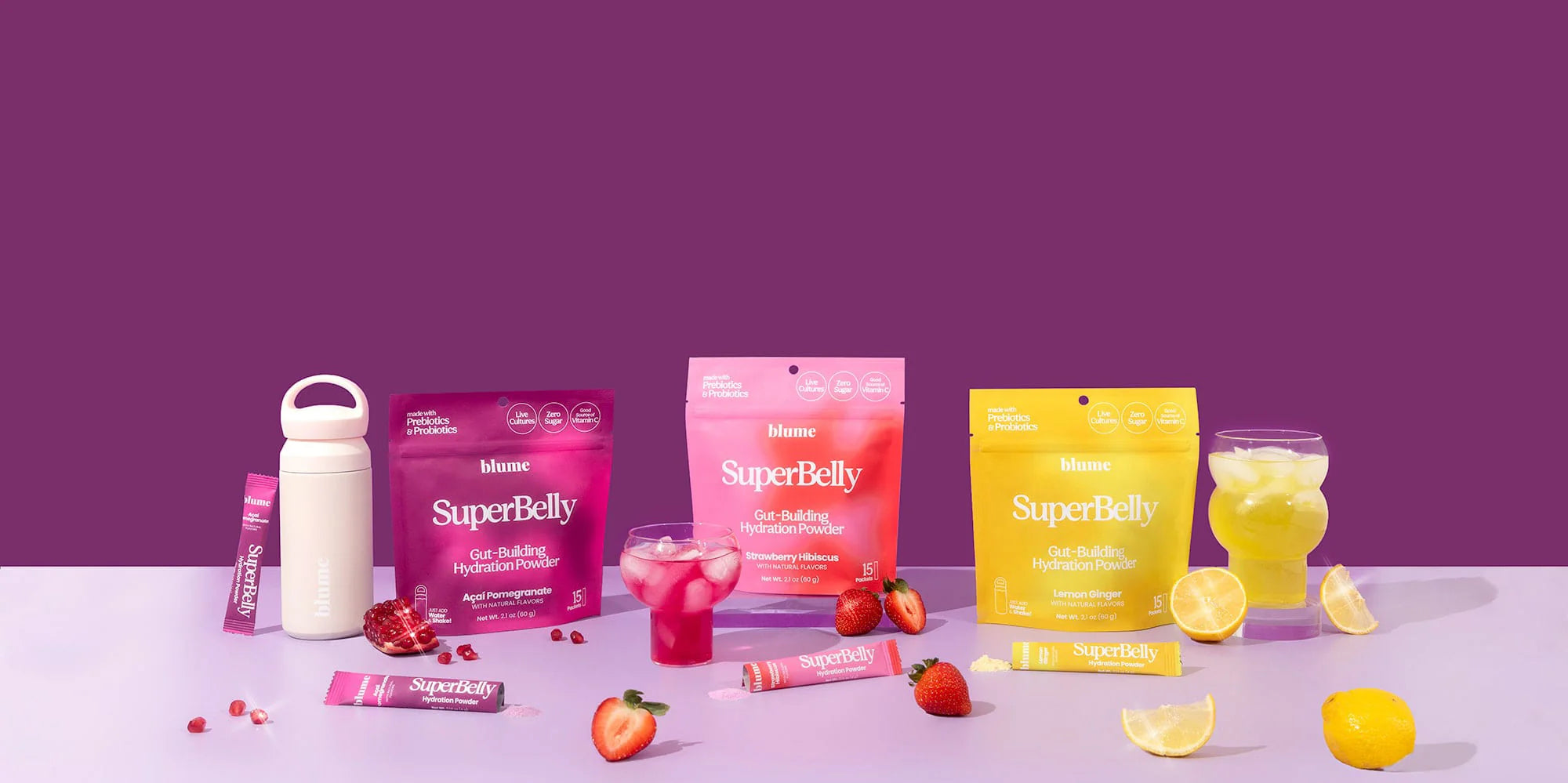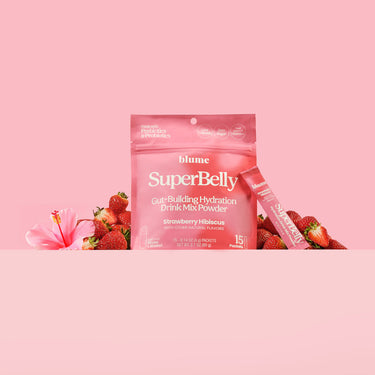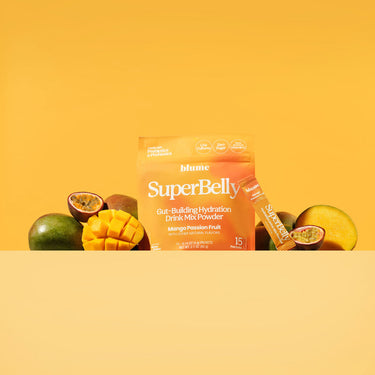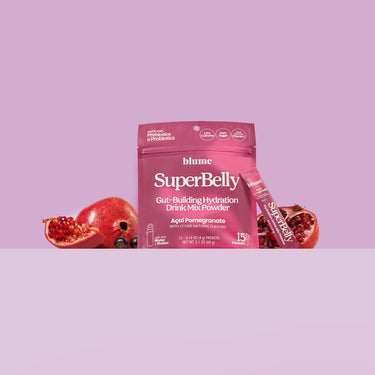Common Symptoms of an Unhealthy Gut
There are hundreds of species of bacteria that reside in the gut. While typically we may think of bacteria as bad, many are actually friendly and critical for our health. The good gut bacteria are important for digestion and immunity, as well as creating vitamin K, B12, and anti-inflammatory short-chain fatty acids. When the gut flora contains too many harmful bacteria and not enough good bacteria, an imbalance can occur. This is also known as dysbiosis (1). Both dysbiosis and a reduction in gut flora diversity have been linked to insulin resistance, inflammatory bowel disease, weight gain, and colorectal cancer (2, 3, 4, 5).
Fatigue
Constipation
Skin Issues
Mood Imbalance
Poor Sleep Quality
Sugar Cravings
The First Step to Healing Our Gut Is Understanding It
Modern life has been hard on our gut microbiome, which explains why over over 60% of adults experience weekly digestive and gut issues, with symptoms including heartburn/reflux, bloating, cramping, constipation, and diarrhea (11). Lifestyle factors like stress, diet and environmental toxins and pollutants have lead to an imbalance of bacteria in our microbiome.
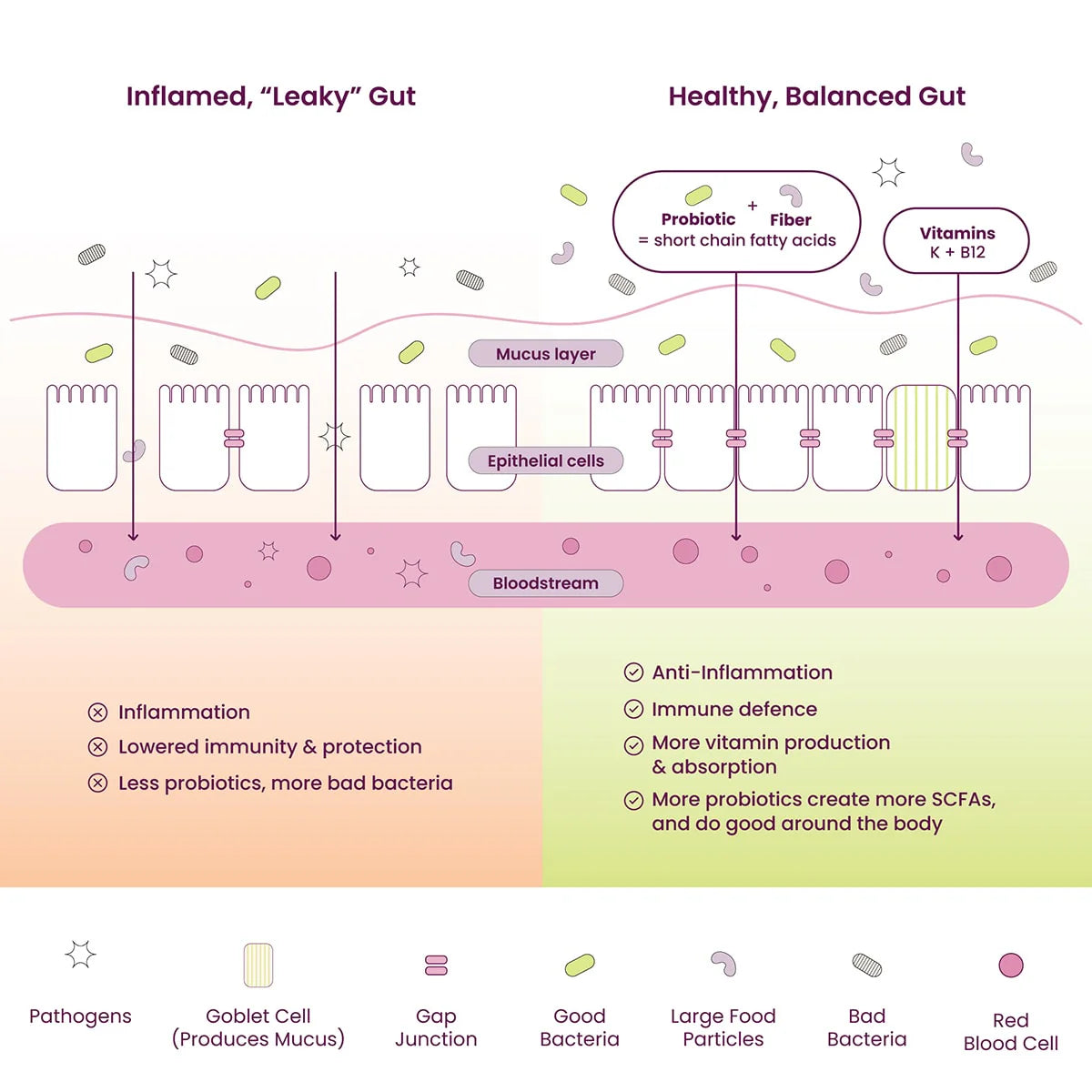
What is the gut microbiome?
The gut microbiome is a microscopic world within your body consisting of trillions of microorganisms of thousands of different species.These include both good and bad bacteria. Most are symbiotic (meaning both our bodies and the bacteria benefit), while some are pathogenic (promoting disease). In a healthy gut microbiome, these bacteria coexist peacefully, butif there is a disturbance in that balance, the body may become more susceptible to diseaseand other negative side effects (12).
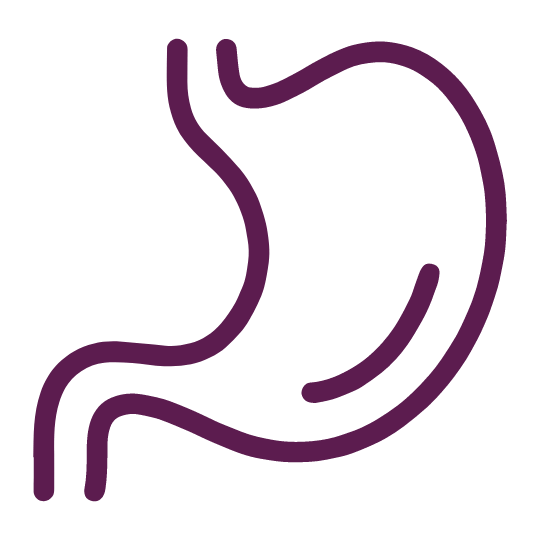
Is low stomach acid a thing?
Many North Americans have low stomach acid, and aren’t aware of it. We often incorrectly connect heartburn to having too much stomach acid, so we take a Tums, which is an antacid. This however lowers our stomach acid even more...
Low stomach acid results in our food not properly being broken down in our stomach by the acid and enzymes. This means our food goes into our small intestine less digested causing bacteria overgrowth. This can cause bloating, leaky gut and bacteria imbalances.
Consuming apple cider vinegar 30 minutes before a meal can increase stomach acid levels, which can in turn improve gut health down the digestive tract, since the food is arriving properly broken down (13).
Apple cider vinegar has acetic acid in it, which is an acid that promotes the secretion of enzymes and acid in the stomach, so it is primed for digestion by the time you eat! It is also a natural probiotic, high in antioxidants, and may help lower blood sugar!
There’s no solid research to prove that this works, but it has been used for centuries, and is often used in naturopathic and holistic nutrition practice.
Other tips to start your digestion off right are:
- Chew your food many times. This will increase stomach acid secretions and enzymes secretion to improve digestion and food breakdown
- Eat slowly to reduce swallowing air causing gas.
- Eat intentionally by being present and not on screens. This allows us to listen to our bodies and fullness levels better.

What are probiotics?
Probiotics are live bacteria, consumed to increase the population of good bacteria present in the gut (14). However, we also 💩 poop out probiotics, so it's important to consume probiotics daily to see the most benefits!
BC30® is a well-researched, shelf stable, spore-forming probiotic that has been scientifically-proven in over 25 published papers to support digestive health, support immune health, and support protein utilization. SuperBelly contains 1 Billion CFU per serving of BC30.
Since gut health research is relatively new to the world of scientific research, there’s a lot we still don’t know. It’s important to do research on probiotics before buying to ensure they will reach your colon, that they are well studied, and are shown to have beneficial effects. You can also ask your health care professional for recommendations. We recommend checking out this website that reviews the level of scientific proof before many probiotics. A level “I” rating is best!

What are prebiotics?
Prebiotics feed good bacteria. In turn, good bacteria will increase its population size and variety, which means stronger bacteria microbiomes. Some examples of prebiotic fiber include inulin, fructans, galacto-oligosaccharides (GOS) which can be found in: oats, wheat, barley, rye, pistachios, cashews, red kidney beans, soybeans, chickpeas, lentils, garlic, onion, peas, leeks, asparagus, cabbage.
Fiber is a non-digestible carbohydrate. Humans can’t digest it, but our bacteria can, by fermenting it, creating short-chain fatty acids (SCFAs) which perform amazing benefits around the body (like being anti-inflammatory). It’s recommended that women get at least 25g of fiber per day, and men get 38g fiber per day. Specifically for gut health, prebiotic fiber is very beneficial to feeding our good gut bacteria.
Most prebiotics are fibers, but not all fibers are prebiotics! Inulin fibre from Jerusalem Artichoke has been shown in studies to have beneficial impacts on reducing constipation, post-meal blood sugar levels, and increased good bacteria levels, especially when consumed in the morning (15).
It's good to note that fibre can cause some people bloating and discomfort if it is not currently in your diet, or you're increasing your intake. It’s important to slowly increase the amount of fiber, and have it with water to reduce risk of constipation. Bloating and gas from increased fiber is actually a sign that your body is fermenting the fiber, meaning beneficial bacteria is consuming it. Gas is an unfortunate by-product of this digestion, however, it should be a temporary feeling and monitored.
Probiotics and prebiotics work synergistically to manage your gut microbiome.

Why is hydration important for my gut?
Hydration is important for flushing toxins out of our systems, supporting skin health, increasing absorption of vitamins, and making you feel full longer. Without enough water, the toxins in our bodies are more concentrated and are removed slower - causing more damage. But an alarming75% of adults are chronically dehydrated!(16)
Magnesium, potassium, calcium and sodium are all electrolytes that help us stay hydrated. They keep a healthy balance of water in our bodies to ensure we are mentally and physically at our best.
Dehydration can cause brain fog, weakness, fatigue, confusion, increase stress response and decrease mood, headaches. Even losing 1% of water content can impair our brain function.
Dehydration also impacts our digestion and gut health in a few ways. When our bodies are dehydrated we are at risk of constipation, which means the toxins and waste are in our systems longer. Constipation can negatively impact our gut bacteria if it is chronic or constant. Water is an essential part of digestion as it keeps our stool moving, is a main component of intestinal secretions, making it necessary for nutrient absorption. Water is also a component of the intestinal lining which houses our gut bacteria (17).
Women should have at least 2.7 liters per day, and men 3.7 litres. This includes tea and coffee. Alcoholic drinks however dehydrate us and need to be balanced with 1 cup of water for every alcoholic drink.
After a workout, sauna, yoga, or even massage session, you should ensure you consume at least 500mL of water if possible for proper recovery.

What do fermented foods do for my gut?
Naturally fermented foods should be a part of your daily diet to ensure probiotic benefits! (18) They are high in antioxidants that act as prebiotics for your gut health. Many cultures around the world have fermented foods in their diet - kimchi, yogurt, kombucha, sauerkraut, have been consumed for centuries in many different parts of the world. However,the Western diet lacks natural probiotics, and on top of that, is less active, and consumes more processed foods that destroy our bacteria diversity. With increased education around the importance of gut health, these foods are being more widely available.
Apple cider vinegar is fermented powder house (which is why we included it in our SuperBelly Gut-Building Hydration Powders).

So How Does It All Connect
Your Gut is Your Second Brain
Your gut is home to what scientists call your"second brain"(aka your Enteric Nervous System). It creates hormones and has100 million nerve cells sending constant messages from our gut to our brain(19). Our brain and gut are intricately connected in so many ways, which is why to take care of our mental health, we need to prioritize our digestive health and diet first.
80% of Your Immune System Comes From the Gut
Many illnesses and conditions are tied to imbalances of gut bacteria and leaky gut. Our gut has the very important job of blocking large food particles, allergens and pathogens from entering our bodies, but when we don't have enough good bacteria to ward off the bad, we start to feel the effects. Leaky gut can be caused by environmental toxins, an unbalanced diet, alcohol, or long term stress response.
Autoimmune diseases like celiac disease, IBS, IBD (Crohn’s, ulcerative colitis), Multiple Sclerosis, T1D, lupus, are all tied to gut bacteria imbalances and leaky gut (20). Our gut holds around 70% of our immune cells and is responsible for around 60-80% of our immune system (21).
95% of Your Serotonin is Produced in the Gut
Since our gut and our brain are so intricately connected, we can actually see direct effects of gut health on mental health and mood.
Our gut produces 95% of our serotonin, our “happy” hormone, and some oxytocin, our “safety” hormone (22). Anxiety can influence gut imbalances, but poor gut health can also increase anxiety symptoms. For example, women are more likely to experience anxiety, and also be diagnosed with gastrointestinal disease and symptoms than men. High cortisol (stress hormone) can cause inflammation in the gut, and even affect the muscles in your stomach, negatively impacting our bowel movements.
Patients with chronic digestive diseases (i.e. IBS, IBD) are significantly more likely to report depression and anxiety than the general population (23). It's also reported that patients with mental health and neurological diagnosis, like autism and ADHD are more likely to have dysbiosis (imbalanced gut bacteria) (21).
With this connection, there’s been a lot more research on how to treat these diseases and conditions. We’ve found that practices like meditation can support gut health and may lower risk of mental health symptoms, and that supporting the gut with probiotics and prebiotics may support treatment for mental health disorders (24).
Skin Issues? Your Gut May Be the Reason
Acne, psoriasis and eczema have been linked to gut bacteria imbalance (20). By taking care of the root cause, gut health, it's possible to reduce the symptoms or flare-ups of these diseases.
Our gut also creates vitamins (B12, K), and controls the absorption of vitamins. Most vitamins we consume need to be metabolized by gut bacteria to be absorbed into our bodies. So despite us taking a healthy dose of critical vitamins, we still need the healthy gut bacteria to make them available to us. Having a healthier, balanced gut increases our vitamin levels, which in turn support our skin hydration and balance.
It's Time to Treat the Cause Instead of the Symptom
We spend a fortune on specialty foods, beauty products and diets to alleviate symptoms from things like acne, mood and low energy. Let’s start with the cause instead.
Superfood Hydration
For a Happy Gut
References
- https://www.ncbi.nlm.nih.gov/pmc/articles/PMC8747253/
- https://pubmed.ncbi.nlm.nih.gov/15082587/
- https://pubmed.ncbi.nlm.nih.gov/23985870/
- https://pubmed.ncbi.nlm.nih.gov/24316595/
- https://www.medicalnewstoday.com/articles/sugar-disrupts-microbiome-and-immune-function-leading-to-metabolic-disorders#:~:text=%E2%80%9CA%20high%2Dsugar%20diet%20promoted,fat%20diet%2Dinduced%20obesity.%E2%80%9D
- https://pubmed.ncbi.nlm.nih.gov/22314561/#:~:text=The%20major%20effects%20of%20stress,mucosal%20blood%20flow%3B%20and%206)
- https://www.ncbi.nlm.nih.gov/pmc/articles/PMC9654651/#:~:text=EDCs%20can%20cause%20dysbiosis%20of,and%20sperm%20viability%20%5B89%5D
- https://www.ncbi.nlm.nih.gov/pmc/articles/PMC8756738/
- https://www.ncbi.nlm.nih.gov/pmc/articles/PMC8001875/
- https://www.ncbi.nlm.nih.gov/pmc/articles/PMC6453579/
- https://www.hsph.harvard.edu/nutritionsource/microbiome/
- https://www.uchicagomedicine.org/forefront/health-and-wellness-articles/debunking-the-health-benefits-of-apple-cider-vinegar
- https://www.mayoclinic.org/healthy-lifestyle/nutrition-and-healthy-eating/expert-answers/probiotics/faq-20058065#:~:text=Probiotics%20are%20foods%20or%20supplements,as%20food%20for%20human%20microflora.
- https://www.mdpi.com/2072-6643/12/10/3035
- https://www.ncbi.nlm.nih.gov/books/NBK555956/
- https://www.everydayhealth.com/digestive-health/gut-check-can-dehydration-affect-your-gut-microbiome/#:~:text=%E2%80%9CHydration%20plays%20a%20key%20role,Wexner%20Medical%20Center%20in%20Columbus.
- https://www.health.harvard.edu/blog/fermented-foods-for-better-gut-health-2018051613841
- https://www.hopkinsmedicine.org/health/wellness-and-prevention/the-brain-gut-connection#:~:text=Scientists%20call%20this%20little%20brain,tract%20from%20esophagus%20to%20rectum.
- https://www.ncbi.nlm.nih.gov/pmc/articles/PMC9271567/
- https://www.autismparentingmagazine.com/probiotics-and-autism/#:~:text=Research%20has%20shown%20that%20probiotic,ADHD)%20for%20children%20with%20ASD
- https://www.ncbi.nlm.nih.gov/pmc/articles/PMC6469458/#:~:text=The%20gut%20provides%20approximately%2095,to%20the%20central%20nerve%20system.
- https://www.ncbi.nlm.nih.gov/pmc/articles/PMC5733421/
- https://www.bmj.com/company/newsroom/deep-meditation-may-alter-gut-microbes-for-better-health/#:~:text=Regular%20deep%20meditation%2C%20practised%20for,open%20access%20journal%20General%20Psychiatry.




